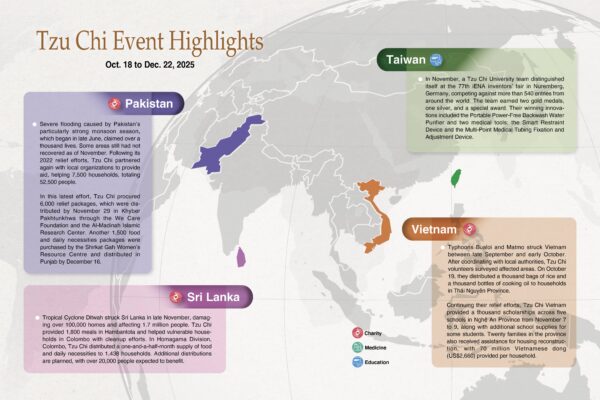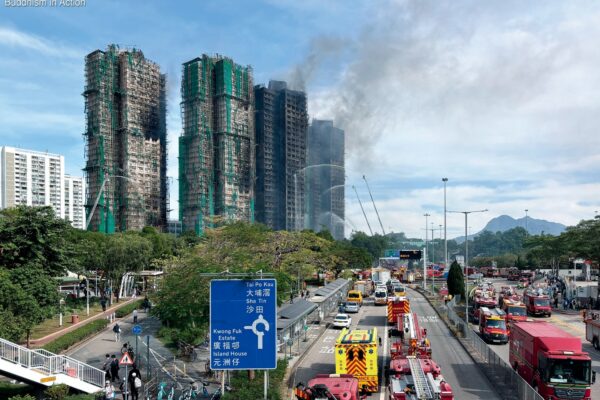By Huang Yu-ying
Translated by Wu Hsiao-ting
Photo by Yan Lin-zhao
His eye condition isn’t an impediment, but an impetus that propels him to reach out to people in need.
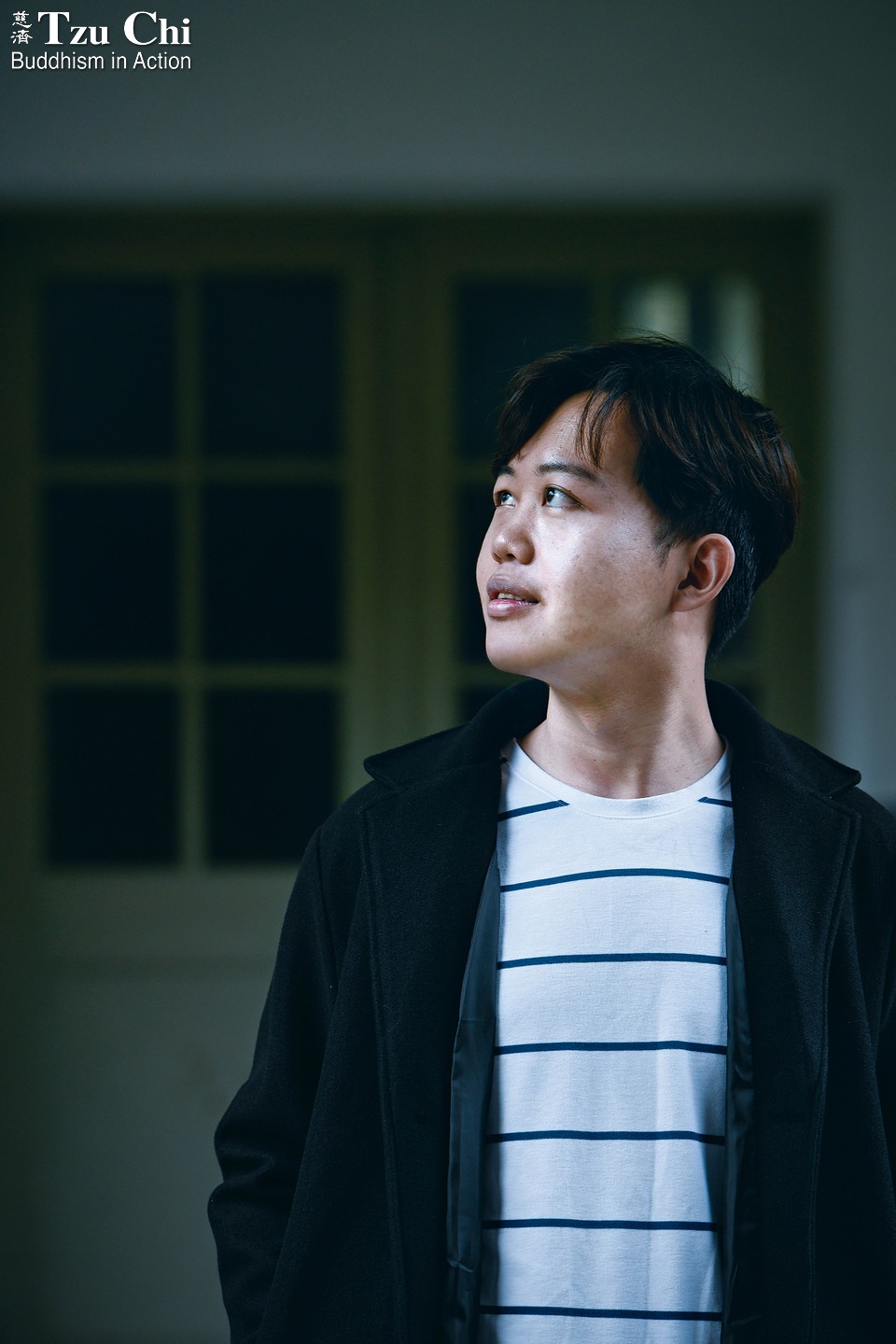
Liu Yu-chen (劉育琛) walks slower than others, but his steps are steady and sure, guided forward by a clear purpose. Setting out on foot from his dormitory at National Taiwan University (NTU), Taipei, he arrives at an MRT station, and from there travels to a seniors’ daycare center for his internship. He started interning at the daycare center in his fourth year at the university and has been doing it for a semester. He has poor vision, but that doesn’t get in the way of the work he does at the center, where he chats with older people and leads activities to improve their physical and cognitive functions. He accompanies social workers to visit seniors at home too.
Yu-chen hails from a rural region in Miaoli, northern Taiwan, but he has lived in Taipei for nearly four years. He is used to getting around on his own, and is carving out a path for himself in a big city. Even as a youngster, he valued his freedom. His visual impairment didn’t hold him back then, and he refuses to let it deter him now from pursuing the life he wants.
A lonely childhood
Yu-chen suffers from congenital retinal detachment. It’s a hereditary condition that runs in his family: his grandmother, father, and sister all suffer from the same condition too.
Despite his eye defect, he doesn’t remember feeling different from normal-sighted people when he was little. However, that changed when he started going to school and attending physical education classes. “I wore very thick eyeglasses when I was little, and when I ran on the athletic field with my classmates, they always noticed things faster than I did,” Yu-chen recalled. “It took me a lot more effort to see stuff, and so my responses were slower than others’.” As a result, he began to feel alienated by his peers. He often felt dejected and grew more and more quiet. His father, Liu Xiu-huang (劉秀煌), saw what was happening and felt deeply for him. He knew what his son was going through, because he suffered from the same eye condition. When Yu-chen got down due to pressure from schoolwork or because his grades weren’t as good as he had hoped, his dad comforted him, saying, “I’ve been there.” He never scolded him for not doing better in school.
To help Yu-chen keep up in school, his teachers, with the help of the parents’ association, purchased a video magnifier for him. With the help of that equipment, Yu-chen, nearsighted with 30 diopters, was finally able to see the writing on the blackboard. That solved a big problem he was facing at school and greatly soothed his anxiety.
But life threw him another curveball when he was in junior high. One fateful day on the school’s basketball court, a flying ball hit his eyeglasses, damaging his eyeballs. He was rushed to the hospital. Surgery saved the sight in his left eye, but his right eye gradually lost what vision it had and became nearly completely blind.
This setback meant that he’d have to expend even more time and energy on his schoolwork if he was to do a good job. Despite the extra challenge, he was undaunted and continued to work hard at school. He sat close to the blackboard in class and listened attentively to his teachers. When he was in elementary school, he had ranked first among the students in his grade. He continued to excel afterwards, winning scholarships every semester during his junior and senior high school years. Seeing his academic achievement, his classmates realized the effort he must have put in, and that led them to notice his other virtues as well. His relationship with his classmates thus became better and better.
Most precious asset
Yu-chen’s family was of limited means. Every time he received his tuition payment notification, he’d first observe whether it was a good time to ask his father for money. If his father wasn’t bringing home much money at the time, he’d put the notification away. Only when his dad had money would he take it out. Poverty was one of the reasons that pushed Yu-chen to study hard. He wanted to earn scholarships to supplement his family’s income so that his father could breathe easier.
Yu-chen’s father never put pressure on him to get good grades in school. “He’s always let me decide for myself if I wanted to do well in school, without pushing me,” Yu-chen said. He appreciated his father’s attitude, which ended up teaching him discipline and increased his confidence. Instead of becoming discouraged by his eye impairment and his family’s poverty, Yu-chen strove to do his best. His efforts paid off. He did very well on his college entrance exam, and was accepted into the Department of Social Work at NTU, one of the most prestigious universities in Taiwan, as well as the Department of Mass Communication at a private university. Though he was very interested in broadcasting, he eventually chose NTU. First, it was more affordable. Second, focusing on social work had a special appeal: “I had been helped by many people along the way, including my teachers and Tzu Chi volunteers. Studying social work might lead to more opportunities for me to give back to them or to society.”
In 2018, Yu-chen left his family in Miaoli and arrived in Taipei to begin his studies at NTU. He was originally shy, but his time at the university gradually transformed him into a confident young man. It didn’t take him long to decide on his future career path. He had seen how rapidly Taiwanese society was aging, and so he decided to pursue a career in long-term care for the elderly. “I’ve seen the hair of the Tzu Chi volunteers who have been caring for my family change from black to white over the years,” he said. “Now it is my turn to take care of them.”
Volunteer Wu Yu-cai (吳玉彩) explained that she and her fellow volunteers started visiting Yu-chen and his family in 2013. In addition to caring for the family, they applied for Tzu Chi New Shoots Scholarships for Yu-chen every year. Tzu Chi started the scholarship program in 2007 to encourage students from underprivileged families to apply themselves in school, nurture good character, and bravely pursue their dreams. Recipients range from elementary to graduate school levels. “Yu-chen was an excellent student and won in the category of scholarly accomplishments for eight years straight,” Wu said.
In 2020, Yu-chen was even asked to give a short speech at a New Shoots Scholarship award ceremony. Volunteers felt he could serve as a model for everyone. “None of us got to choose what kind of family we were born into,” he said to his fellow recipients in the audience. “Our lives might be more difficult than others’, but that also brings out more courage in us. I hope that when you grow up, you can step up here on this stage and share with everyone how you’ve overcome the hardship that life threw at you and how you’ve done your best despite everything. Working hard to overcome all the obstacles before you will one day become your most unique and precious asset.”
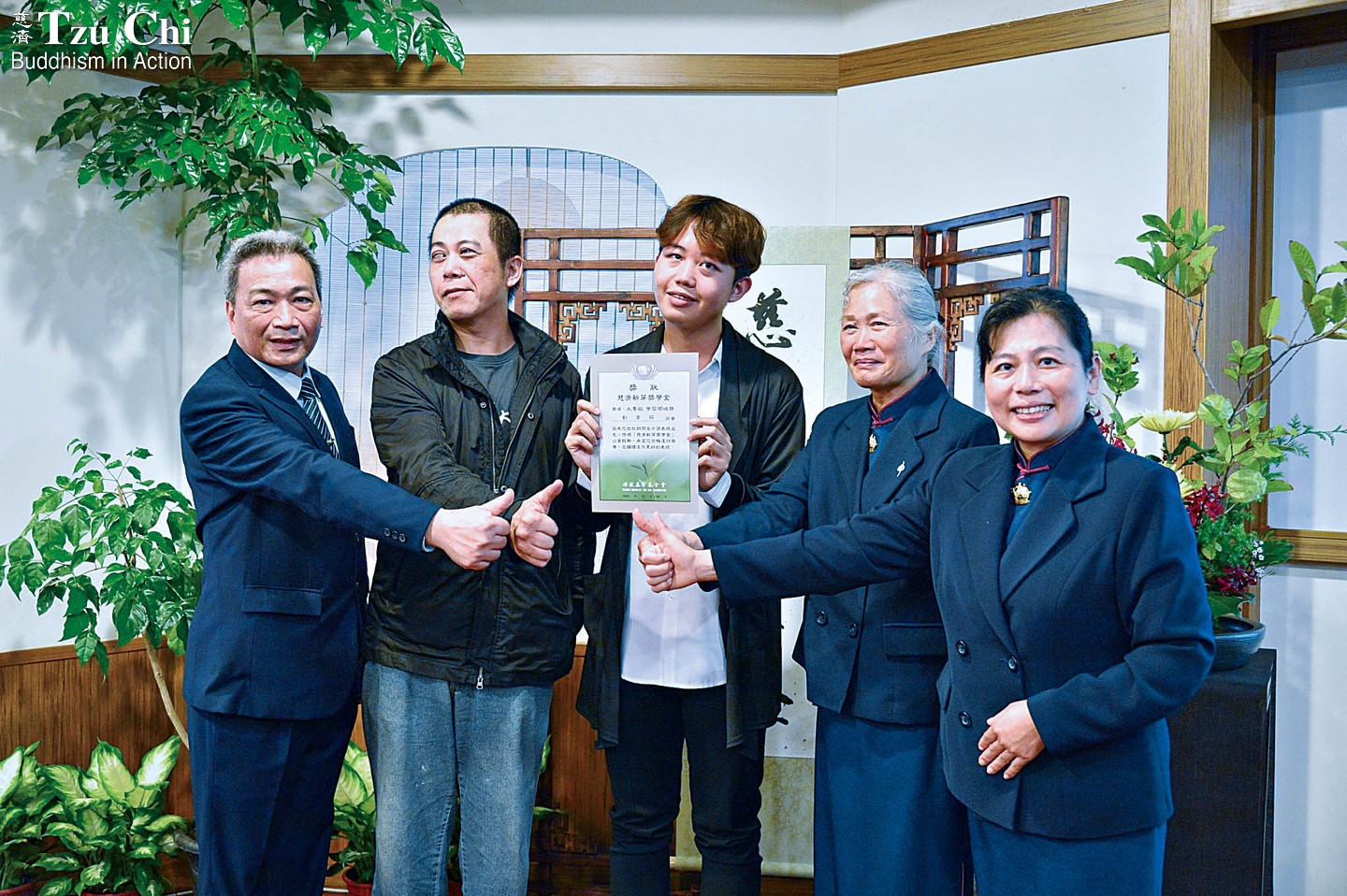
Liu Yu-chen (middle) and his father, Xiu-huang (second from left), pose with Wu Yu-cai (second from right) and other Tzu Chi volunteers in a New Shoots Scholarship award ceremony in 2020. Ou Ming-da
Reaching out to the vulnerable
Yu-chen is more than just an excellent student—he devotes a lot of his energy to social services too. He volunteers through a school club at NTU as a tutor for students at Dongyin Elementary and Junior High School, located on an offshore island of Taiwan. He teaches youngsters there with the help of videoconferencing. When he was a sophomore, he founded a club at NTU dedicated to the care of the homeless. Members of the club began serving street people in December 2019. “For us college students,” Yu-chen said, “the homeless are a very special group, and one of the most vulnerable, destitute, and disadvantaged groups in society.”
As part of the club’s work, Yu-chen and other members visit the homeless at Taipei Main Station and distribute clothes and other basic necessities they have collected. They don’t just leave the stuff and walk away, but take the time to sit and chat with the homeless. They get to know the street people better through such chats.
Yu-chen and his fellow club members have distributed necessities to the homeless many times over the last two years. They also give out boxed meals and work towards having the public accept the homeless.
Yu-chen is in charge of public relations for the club. He handles speaking invitations and raises money for their work. The club is doing pretty well; its fan page on Facebook has more than 9,000 followers.
Yu-chen has discovered through his work for the homeless that some of them have had life experiences similar to his. For a long time when he was a child, he’d return home from school when his father was still away at work. When he felt hungry, he had no money on him to buy food to eat and could only starve. He remembers to this day his hunger pangs at the time. Experiences like this make it easier for him to empathize with the needy.
Every obstacle is a chance for growth
Yu-chen has lived a life that’s been harder than most, but he views the challenges he has encountered as opportunities that help him grow. He says it’s like playing a video game with different difficulty levels. If you choose the easy level, you might breeze through the game without any hassle. But you feel a greater sense of achievement when you take the challenge of the difficult level and successfully work through it. “My life was set at a difficult level from the start,” Yu-chen said, “but I accepted the challenges and kept working through them. I believed that if I persevered, I’d be richly rewarded at the end. There’s nothing wrong with an easy life, but every bend in the road gives you an opportunity to grow.”
When he was little, he couldn’t understand why he was different from others. He was caught in a tangled web of doubt. It wasn’t until he became a fifth grader that things began to change. That year, he was recommended by people with the Taiwan Fund for Children and Families, a nonprofit organization that provides services to vulnerable children and families, for some competitions and outdoor activities. He won some awards, but more importantly, he met other children facing serious obstacles, just like him. It was only then that he realized he wasn’t fighting alone. In addition, he had the extra support of a family and a home.
“I’ve learned via my work for the homeless that their definition of home is not just a place where they can sleep and shelter from the elements,” Yu-chen said. He’s observed that some street people actually have homes to which they could return, but they choose not to. These people choose to stay on the streets because they feel the streets are their real home—they have friends there and feel an emotional connection there. “It’s the same with me. My dormitory, for example, is a place where I can sleep and be protected from the elements, but it is not home. Home is where there are people waiting for me to return.”
Yu-chen feels blessed because his parents love him very much. Getting by might not be easy for them, but their family is happy together.
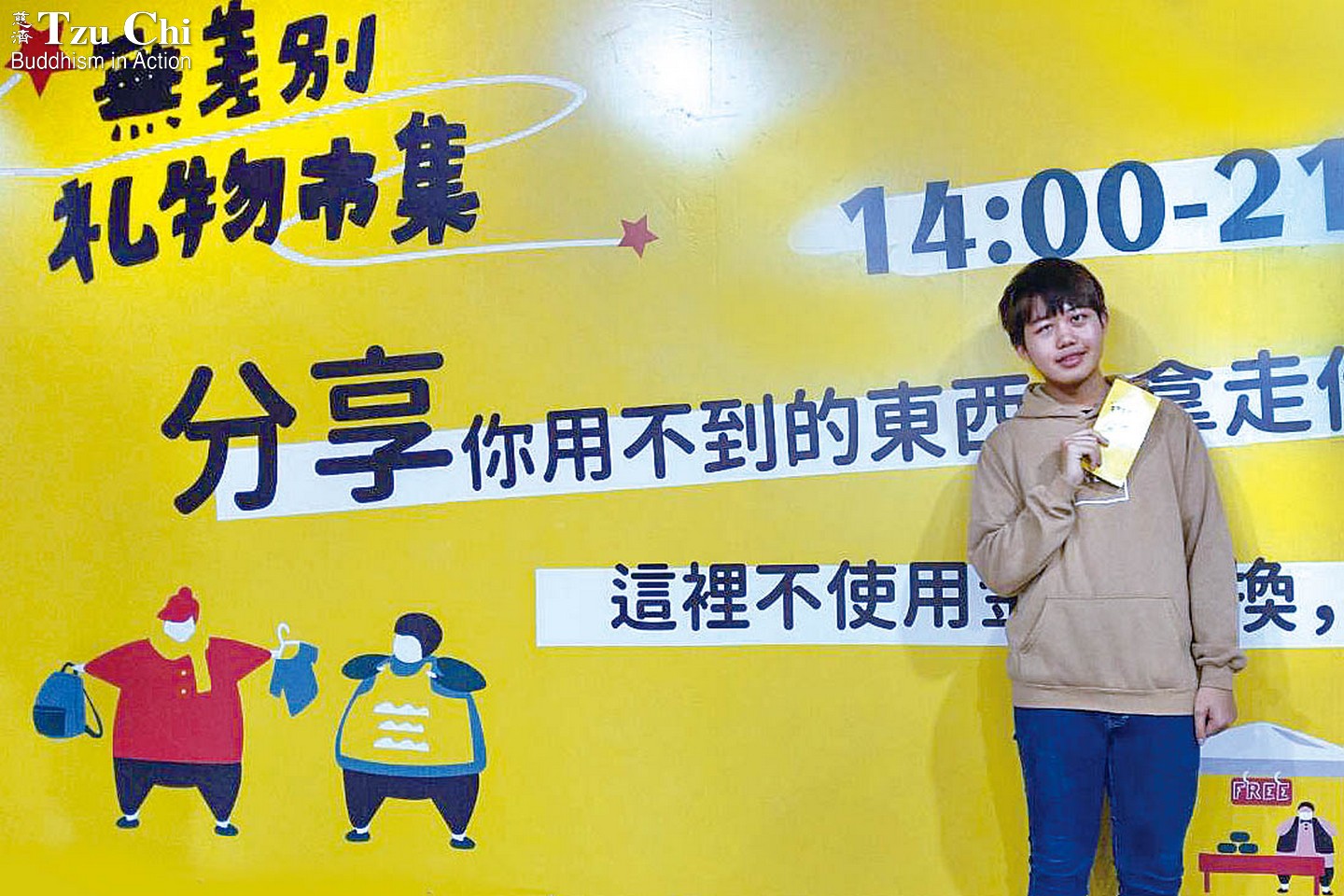
Liu Yu-chen stands in front of a poster for a bazaar he organized. He encouraged his schoolmates to donate things they did not need to share with others at the bazaar. Courtesy of Liu Yu-chen
Love from all around
In August 2021, Yu-chen won the Presidential Education Award for his courage and perseverance in the face of adversity and for making himself shine against all odds. He received help from many people in the process of applying for the award. His teachers, classmates, and people from the Taiwan Fund for Children and Families helped him prepare the required data; social workers at the Tzu Chi Taichung office in central Taiwan wrote a letter of recommendation for him; and Tzu Chi volunteers even accompanied him to be interviewed by the selection committee for the award. Yu-chen knows how integral all this support was in garnering the award. He keeps in mind every bit of help he received and plans to give back one day. “Receiving the Presidential Education Award doesn’t mean I’ve reached the end of my journey,” Yu-chen emphasized. “Instead, it means that I should strive to do more for society and help more underprivileged groups to be seen and heard.”
Tzu Chi social workers and volunteers have been there for Yu-chen and his family for eight years. They have witnessed how Yu-chen surmounted his learning challenges, transcended his limitations, and overcame doubts about himself to ultimately get into a prestigious university. What impressed them even more was how he uses his positive energy to influence people around him. Ji Wan-ting (紀婉婷), a social worker at the Tzu Chi Taichung office, often discusses events or articles related to social services with Yu-chen in her free time. She cares for him like an older sister.
She remembers the panic buying of disinfectant alcohol and personal protective equipment that occurred in Taiwan when COVID-19 cases started emerging in northern Taiwan in 2020 and a spike in confirmed infections and deaths was reported abroad. The result was a shortage of such goods. Yu-chen was among those who couldn’t obtain such items. Ji considered that since Yu-chen was living in Taipei, where the coronavirus situation was more severe, he would need such supplies more than she did. So she packed some disinfectant alcohol, alcohol hand wipes, and vitamins she had at home into a large box and mailed it to Yu-chen to help protect him and ease his mind.
Ji has nothing but good things to say about Yu-chen. She’s never heard him complain about anything, nor does he let his achievements go to his head. He is studious and eager to improve himself. Besides his major in university, he does his best to broaden his knowledge in other fields of study. “He takes full responsibility for his life, and reaches out to help others,” Ji commented. “I believe that the love and nurture he has received from Tzu Chi volunteers will become important nutrients for him on his future life path. We, on the other hand, are inspired to see him paying forward the love and kindness he has received from others.”
Set on helping others
Yu-chen is graduating from university this summer, but he has already tested into NTU’s Graduate Institute of Social Work, so he will stay on in school. He has drawn up a blueprint for his future. Now interning at a seniors’ daycare center, he is looking forward to carrying out research work on long-term care for the elderly, hoping to improve Taiwan’s care for older people by improving the government’s policies in this area.
The course load in graduate school will be more challenging, but Yu-chen is ready to take it on. “I’ve learned how to better manage my time since high school,” he said. “I set aside time for things I need to do, dividing my tasks and dedicating specific time blocks for each of them.” He can’t spend long periods of time reading or using a computer because of his poor eyesight, but organizing his time and spreading out his workload this way prevents him from putting too much of a strain on his eyes at any one time. It even increases his efficiency.
When asked to rate his performance so far, he said, “I give myself 80 points [out of 100].” In his mind, he still has many unfinished tasks and dreams to fulfill. He wants to do more for the homeless and to provide them with more in-depth services. He wants to do more for other sectors of society too.
Thank you for telling me you believe in me So that my dream stops being just a dream.
Let’s face the future together
And work for every tomorrow.
During an interview on Tzu Chi’s Da Ai e-Radio, Yu-chen sang the song “Thank you” to express his gratitude to everyone who has helped him along the way. Such people included his teachers through his school years, people from charity organizations, and social welfare workers. He also pledged to continue working for Taiwan’s society. “Others ‘see’ me because I can’t see,” he said. “I’ll try to ‘see’ and reach out to more people as best I can as I continue down life’s path.”

